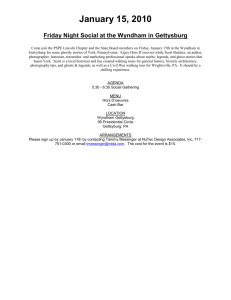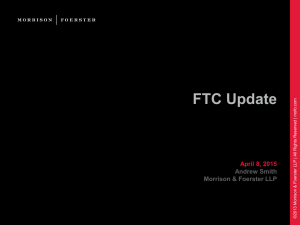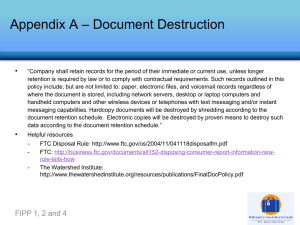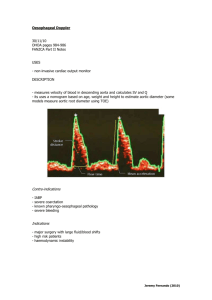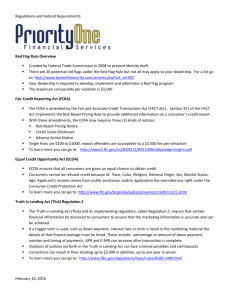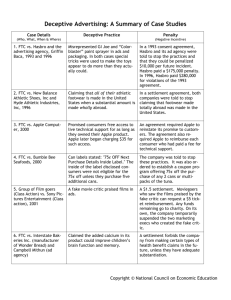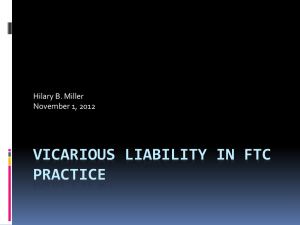Data Security: FTC v. Wyndham Corporation
advertisement
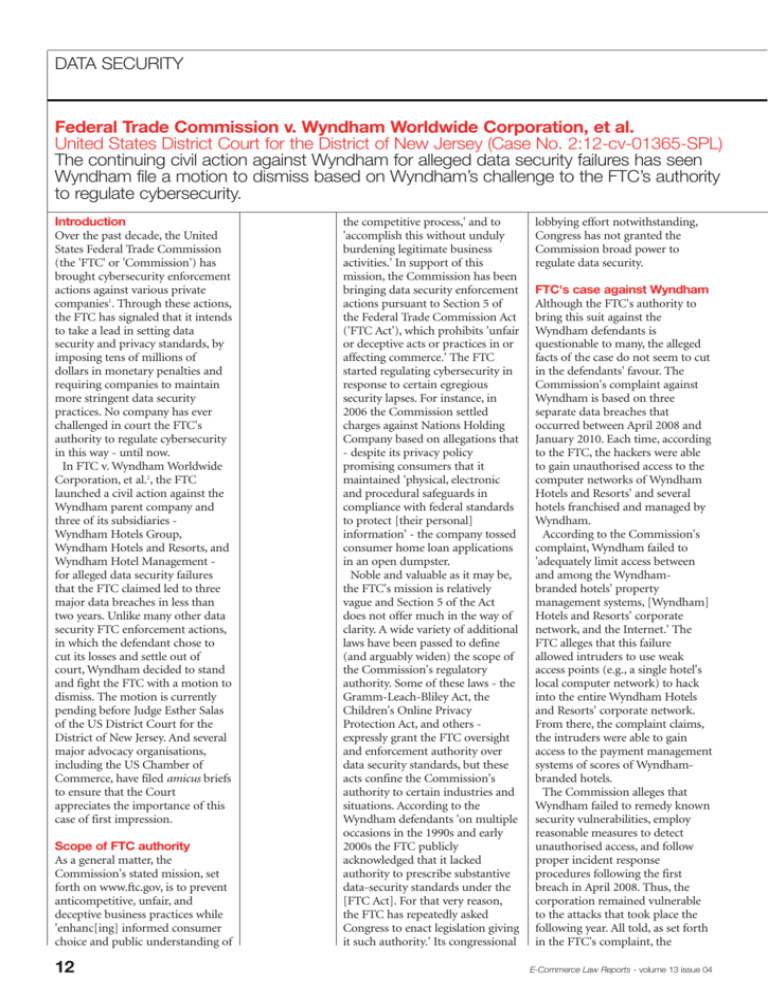
DATA SECURITY
Federal Trade Commission v. Wyndham Worldwide Corporation, et al.
United States District Court for the District of New Jersey (Case No. 2:12-cv-01365-SPL)
The continuing civil action against Wyndham for alleged data security failures has seen
Wyndham file a motion to dismiss based on Wyndham’s challenge to the FTC’s authority
to regulate cybersecurity.
Introduction
Over the past decade, the United
States Federal Trade Commission
(the 'FTC' or 'Commission') has
brought cybersecurity enforcement
actions against various private
companies1. Through these actions,
the FTC has signaled that it intends
to take a lead in setting data
security and privacy standards, by
imposing tens of millions of
dollars in monetary penalties and
requiring companies to maintain
more stringent data security
practices. No company has ever
challenged in court the FTC's
authority to regulate cybersecurity
in this way - until now.
In FTC v. Wyndham Worldwide
Corporation, et al.2, the FTC
launched a civil action against the
Wyndham parent company and
three of its subsidiaries Wyndham Hotels Group,
Wyndham Hotels and Resorts, and
Wyndham Hotel Management for alleged data security failures
that the FTC claimed led to three
major data breaches in less than
two years. Unlike many other data
security FTC enforcement actions,
in which the defendant chose to
cut its losses and settle out of
court, Wyndham decided to stand
and fight the FTC with a motion to
dismiss. The motion is currently
pending before Judge Esther Salas
of the US District Court for the
District of New Jersey. And several
major advocacy organisations,
including the US Chamber of
Commerce, have filed amicus briefs
to ensure that the Court
appreciates the importance of this
case of first impression.
Scope of FTC authority
As a general matter, the
Commission's stated mission, set
forth on www.ftc.gov, is to prevent
anticompetitive, unfair, and
deceptive business practices while
'enhanc[ing] informed consumer
choice and public understanding of
12
the competitive process,' and to
'accomplish this without unduly
burdening legitimate business
activities.' In support of this
mission, the Commission has been
bringing data security enforcement
actions pursuant to Section 5 of
the Federal Trade Commission Act
('FTC Act'), which prohibits 'unfair
or deceptive acts or practices in or
affecting commerce.' The FTC
started regulating cybersecurity in
response to certain egregious
security lapses. For instance, in
2006 the Commission settled
charges against Nations Holding
Company based on allegations that
- despite its privacy policy
promising consumers that it
maintained 'physical, electronic
and procedural safeguards in
compliance with federal standards
to protect [their personal]
information' - the company tossed
consumer home loan applications
in an open dumpster.
Noble and valuable as it may be,
the FTC's mission is relatively
vague and Section 5 of the Act
does not offer much in the way of
clarity. A wide variety of additional
laws have been passed to define
(and arguably widen) the scope of
the Commission's regulatory
authority. Some of these laws - the
Gramm-Leach-Bliley Act, the
Children's Online Privacy
Protection Act, and others expressly grant the FTC oversight
and enforcement authority over
data security standards, but these
acts confine the Commission's
authority to certain industries and
situations. According to the
Wyndham defendants 'on multiple
occasions in the 1990s and early
2000s the FTC publicly
acknowledged that it lacked
authority to prescribe substantive
data-security standards under the
[FTC Act]. For that very reason,
the FTC has repeatedly asked
Congress to enact legislation giving
it such authority.' Its congressional
lobbying effort notwithstanding,
Congress has not granted the
Commission broad power to
regulate data security.
FTC's case against Wyndham
Although the FTC's authority to
bring this suit against the
Wyndham defendants is
questionable to many, the alleged
facts of the case do not seem to cut
in the defendants' favour. The
Commission's complaint against
Wyndham is based on three
separate data breaches that
occurred between April 2008 and
January 2010. Each time, according
to the FTC, the hackers were able
to gain unauthorised access to the
computer networks of Wyndham
Hotels and Resorts' and several
hotels franchised and managed by
Wyndham.
According to the Commission's
complaint, Wyndham failed to
'adequately limit access between
and among the Wyndhambranded hotels' property
management systems, [Wyndham]
Hotels and Resorts' corporate
network, and the Internet.' The
FTC alleges that this failure
allowed intruders to use weak
access points (e.g., a single hotel's
local computer network) to hack
into the entire Wyndham Hotels
and Resorts' corporate network.
From there, the complaint claims,
the intruders were able to gain
access to the payment management
systems of scores of Wyndhambranded hotels.
The Commission alleges that
Wyndham failed to remedy known
security vulnerabilities, employ
reasonable measures to detect
unauthorised access, and follow
proper incident response
procedures following the first
breach in April 2008. Thus, the
corporation remained vulnerable
to the attacks that took place the
following year. All told, as set forth
in the FTC's complaint, the
E-Commerce Law Reports - volume 13 issue 04
DATA SECURITY
intruders compromised over
600,000 consumer payment card
accounts, exported hundreds of
thousands of payment card
account numbers to a domain
registered in Russia, and used them
to make over $10.6 million in
fraudulent purchases.
Based on these factual allegations,
the Commission's complaint
charges that Wyndham's data
security practices were both unfair
and deceptive in violation of
Section 5 of the FTC Act.
Specifically, the Commission
claims that Wyndham's failure to
'employ reasonable and
appropriate measures to protect
personal information against
unauthorized access' constitutes
unfair acts or practices insofar as
they 'caused or are likely to cause
substantial injury to consumers
that consumers cannot reasonably
avoid themselves and that is not
outweighed by countervailing
benefits to consumers or
competition.'
Additionally, the Commission
argues that, in light of the
Wyndham's failures to protect user
data, the defendants' privacy
policies are false or misleading and
therefore violate the FTC Act's
prohibition against deceptive acts
and practices. The privacy policies
that the FTC is referring to were
posted on the Wyndham Hotels
and Resorts website and stated that
they 'safeguard [their] customers'
personally identifiable information
by using industry standard
practices' and they 'make
commercially reasonable efforts to
make [their] collection of such
information consistent with all
applicable laws and regulations.'
Wyndham's motion to dismiss
In most instances, companies faced
with similar alleged facts have
settled with the Commission in
order to reduce litigation cost and
the public scrutiny that often
E-Commerce Law Reports - volume 13 issue 04
attends a protracted enforcement
action. For instance - in July of this
year, the Commission approved a
final order settling charges against
HTC America Inc. stemming from
allegations that the technology
company 'failed to take reasonable
steps to secure the software it
developed for its smartphones and
tablet computers.' The order did
not include any monetary
sanctions; however, it did outline
the steps that HTC must take in
order to establish a comprehensive
data security plan. As such, as some
of the amicus claim, in the data
security space the Commission has
been able to engage in 'regulationby-settlement,' free of the required
judicial and congressional checks
on its power. The Commission
then points to those (essentially
uncontested) settlements as proof
of its regulatory authority. In
August of last year, Wyndham
broke that mould by filing a
motion to dismiss.
Wyndham opened its motion to
dismiss by highlighting the fact
that, to its knowledge, the
criminals who hacked into its
computer network 'were never
apprehended by authorities and no
hotel guest suffered financial harm
as a result of these crimes.'
Wyndham also attempted to put
the FTC's arguably egregious
factual allegations in context by
noting that hacking has become an
'endemic problem,' one that has
affected even the most
sophisticated private companies
and government entities: Google,
Microsoft, the CIA, NASA, the FBI,
and the FTC itself.
The bulk of Wyndham's motion
addresses the FTC's 'unfairness'
claim, asserting that it is a classic
example of agency overreach. As
Wyndham sees it, the Commission
is attempting to circumvent the
legislative process by acting as if 'it
has the statutory authority to do
that which Congress has refused:
establish data-security standards
for the private sector and enforce
those standards in federal court.'
The Wyndham defendants argue
that the unfairness claim must be
dismissed for four reasons: (i) the
FTC's 'unfairness' authority does
not extend to data security; (ii)
even assuming that it was
authorised to regulate data
security, any such requirements
would have to be established
through proper rulemaking; (iii)
Section 5 of the FTC Act does not
govern the security of payment
card data; and (iv) the unfairness
count fails federal pleadings
requirements.
Then, in comparatively short
shrift, Wyndham attempts to
dismantle the FTC's deception
claim by asserting that 'the FTC
fails to recognize the fundamental
distinction between the data
collected by [Wyndham Hotels and
Resorts] itself (to which the
privacy policy applies) and data
collected by the independently
owned Wyndham branded hotels
(to which the policy expressly does
not apply).' After quoting the
language from the Wyndham
Hotels and Resorts' privacy policy
that expressly disclaims any
responsibility over the branded
hotels' security practices and
procedures, the defendants argue
that, taken as a whole, defendants'
privacy policy is not deceptive.
'Friend of the court' (amicus)
briefs
The defendant's arguments are
strong and persuasive. However,
because the scope of the FTC's
authority to regulate data security
is a matter of first impression
before the federal courts, several
advocacy organisations have filed
amicus briefs in support of
Wyndham to ensure that the court
appreciates the reach of its
forthcoming ruling.
In a joint effort, four
13
DATA SECURITY
membership-based business
advocacy organisations - the
Chamber of Commerce of the
United States, the Retail Litigation
Center, the American Hotel &
Lodging Association, and the
National Federation of
Independent Businesses - penned
one such brief. In it, they note that
this is not the first time that the
FTC has attempted to 'advance its
consumer protection goals in ways
far beyond those envisioned by
Congress.' They assert that the
FTC's current action against
Wyndham is emblematic of the
Commission's decade-long
endeavour to leverage its
enforcement authority under
Section 5 to 'extract settlements
from businesses that themselves
have been victimized by data
security breaches' without first
giving them formal notice of the
standards that they are accused of
breaching. These organisations are
very critical of what they describe
as the Commission's use of
'incremental - and unilateral regulation-through-settlement,'
which 'subjects American
businesses to vague, unknowable,
and constantly changing data
security standards.'
Another amicus brief was filed
jointly by TechFreedom, the
International Center for Law and
Economics, and Consumer
Protection Scholars. Whereas the
Chamber, et al. brief was filed to
support the interests of their
membership, these organisations'
interests in the case stems from
broader policy perspectives that
have aligned around calling the
FTC to task. In their words, the
questions they raise 'are not about
the adequacy of Wyndham's data
security practices in particular, or
even whether they could
conceivably be declared unfair
upon a full analysis of the facts and
proper development of limiting
principles.' Instead, their brief
14
'speaks to the fundamental
problems of vagueness and due
process raised by the FTC's routine
enforcement actions prior to any
adjudication by any court.' Their
approach is twofold. First, they are
calling on the court to 'demand
that the FTC develop the law of
data security through rulemakings,
and other forms of guidance to
give companies notice of how
unfairness applies to them.'
Second, they are asking that the
court to establish pleading
standards as a means of reining in
the FTC's 'current model of using
conclusory allegations to pressure
companies to settle.'
Conclusion
The Wyndham defendants are not
arguing that the federal
government should not regulate
data privacy standards, nor are any
of the various organisations filing
briefs in support of their motion to
dismiss. Instead, they claim that
the FTC has attempted to
circumvent the legislative and
administrative rulemaking process.
And their arguments are more
specific than a general position that
overregulation stymies commerce
and trade. These companies and
advocates suggest that the FTC's
approach is particularly harmful
because it does not offer clear
guidelines for businesses to follow.
If a business cannot be sure that it
is operating within the scope of a
particular federal guideline, then it
cannot be certain how to structure
its data security procedures, and
has no way to protect itself in the
event of government enforcement
actions and private lawsuits. If the
FTC were to use formal notice and
comment rulemaking proceedings,
the FTC would propose rules and
explain its reasoning and interested
parties would have an opportunity
to provide comments for the FTC
to consider. After consideration,
the FTC would publish its findings.
For Wyndham and the various
'friends of the court,' this would be
a preferred, more transparent and
proper way to regulate data
security.
If Wyndham prevails, the case
could usher in a major reduction
in FTC enforcement efforts.
However, if the court sides with the
FTC, the Commission will be
further empowered to regulate data
security practices. With such high
stakes on both sides, any decision is
likely to result in an appeal. In the
meantime, companies in various
industry sectors that maintain
personal consumer information
are anxiously awaiting the district
court's decision.
Michelle W. Cohen Member and
Certified Information Privacy Professional
(US)
Casselle A.E. Smith Associate
Ifrah PLLC
michelle@ifrahlaw.com
csmith@ifrahlaw.com
1. http://ftcbeat.com/category/
cybersecurity/
2. http://www.ftc.gov/os/caselist/
1023142/
E-Commerce Law Reports - volume 13 issue 04

